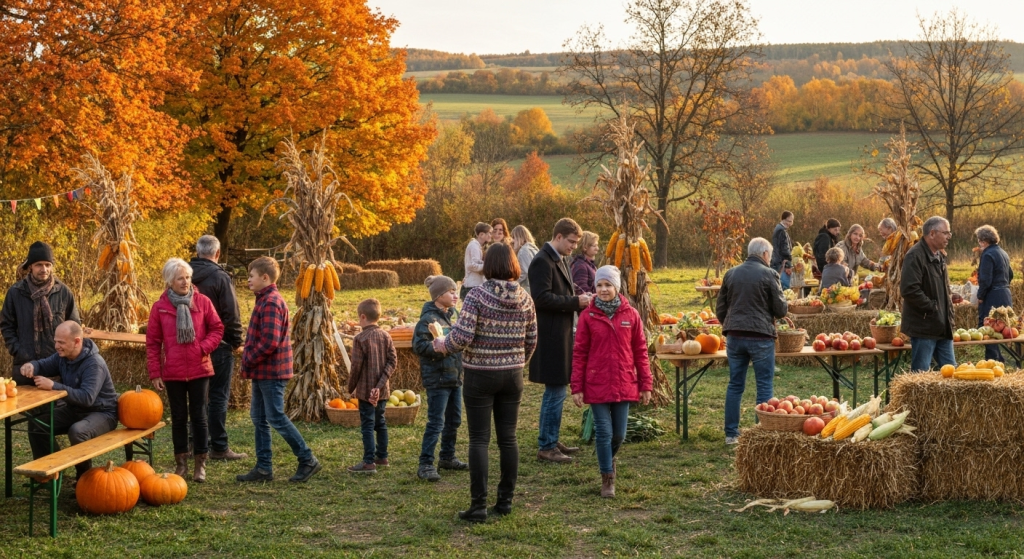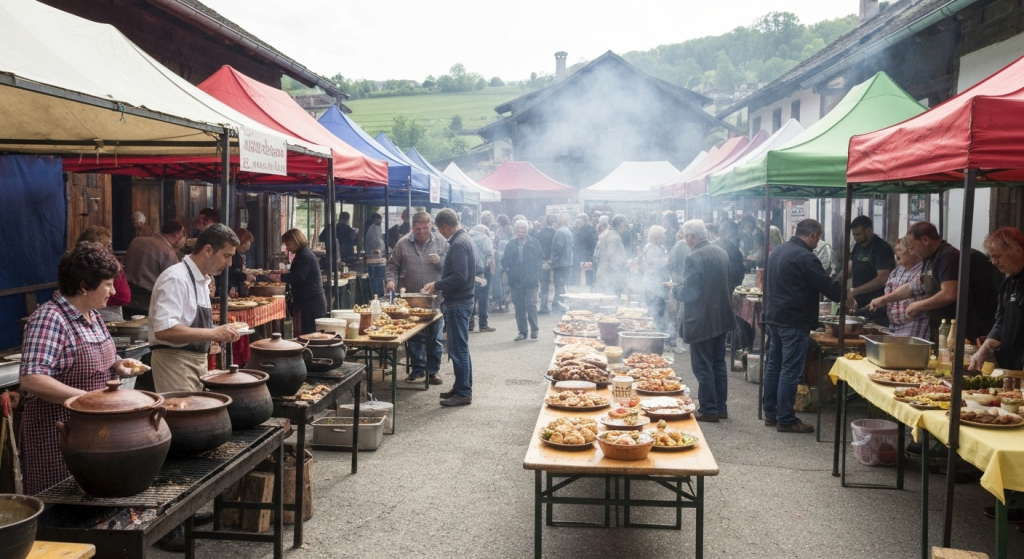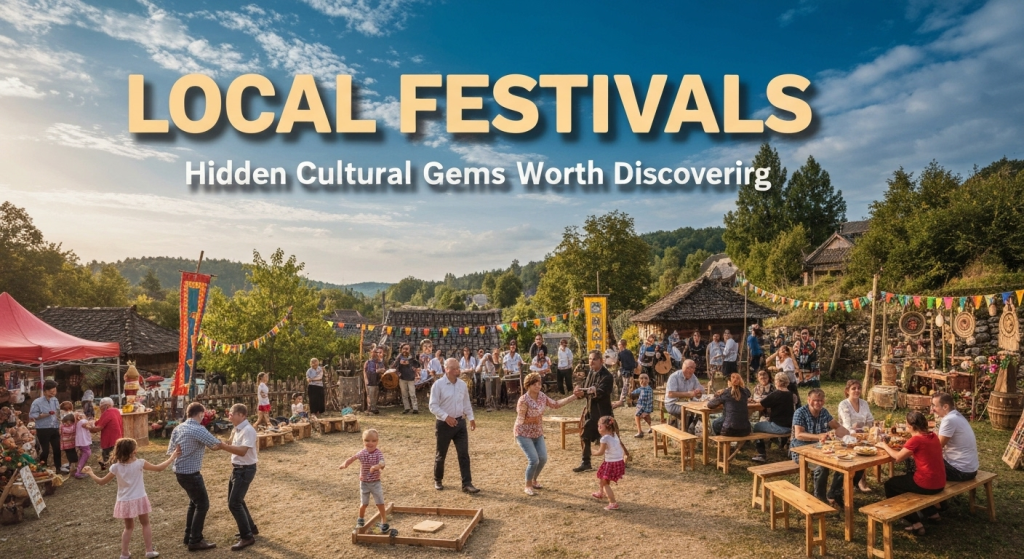Local festivals represent the heartbeat of communities worldwide. These celebrations showcase authentic traditions, bring neighbors together, and offer visitors genuine cultural experiences far from tourist crowds. After five years exploring festivals across different regions, I’ve discovered that the most memorable celebrations often happen in small towns and villages where traditions run deep.
My name is Mahnoor Farooq, and I’ve spent the past five years documenting local festivals as a cultural researcher and travel writer. My passion for authentic celebrations began during a chance encounter with a harvest festival in a remote Pakistani village. Since then, I’ve attended over 150 local festivals across four continents, building relationships with community leaders and understanding the deep cultural significance behind these gatherings.
What Makes Local Festivals Special
Local festivals differ dramatically from large commercial events. They preserve ancient traditions, strengthen community bonds, and offer authentic experiences that mass tourism cannot replicate. These celebrations often center around seasonal changes, religious observances, or historical events specific to their regions.
The authenticity factor sets local festivals apart. Community members organize these events with genuine passion rather than profit motives. Visitors witness real traditions passed down through generations, taste authentic regional foods, and participate in activities that hold deep cultural meaning for locals.
Key Characteristics of Authentic Local Festivals
| Feature | Local Festivals | Commercial Events |
|---|---|---|
| Organization | Community volunteers | Professional event companies |
| Attendance | 100-5,000 people | 10,000+ people |
| Duration | 1-3 days | Multiple weeks |
| Cost | Free or minimal fees | Expensive tickets |
| Authenticity | Traditional practices | Entertainment-focused |
| Food | Homemade local dishes | Commercial vendors |
Local festivals also provide economic benefits to small communities. Money spent during these events directly supports local businesses, artisans, and food vendors. Many festivals showcase traditional crafts and skills that might otherwise disappear.
The Magic of Seasonal Celebrations

Seasonal festivals connect communities to natural cycles and agricultural traditions. These celebrations mark important transitions throughout the year and often include ancient rituals adapted for modern times.
Spring festivals celebrate renewal and planting seasons. Summer gatherings focus on abundance and community cooperation. Autumn festivals honor harvests and prepare communities for winter months. Winter celebrations bring light and warmth during dark periods.
Notable Seasonal Festival Elements
Spring celebrations typically feature flower decorations, seed blessing ceremonies, and cleaning rituals. Summer festivals include outdoor dancing, communal cooking, and games for children. Autumn festivals showcase harvest displays, preservation techniques, and thanksgiving ceremonies. Winter festivals incorporate fire ceremonies, storytelling traditions, and gift exchanges.
The seasonal connection helps preserve agricultural knowledge and environmental awareness. Younger generations learn about natural cycles, traditional farming methods, and sustainable living practices through festival participation.
Religious and Spiritual Festivals
Many local festivals have religious or spiritual foundations that create powerful community experiences. These celebrations often combine formal religious observances with cultural traditions unique to specific regions.
Religious festivals vary widely across different faiths and denominations. Christian communities might celebrate patron saint days with processions and communal meals. Islamic festivals could feature Quran recitations and charitable activities. Hindu celebrations might include temple ceremonies and colorful decorations. Buddhist festivals often emphasize meditation and community service.
Elements of Spiritual Local Festivals
Religious festivals typically include prayer services, community meals, charitable activities, and cultural performances. Sacred music, traditional dances, and storytelling often accompany religious observances. Many festivals also feature blessing ceremonies for crops, animals, or community projects.
The spiritual aspect creates deeper connections between participants. People experience shared faith, community support, and cultural continuity. These festivals often provide comfort during difficult times and strengthen social bonds within communities.
Pros of Religious Festivals:
- Deep spiritual experiences
- Strong community bonds
- Preserved traditions
- Charitable activities
- Cultural education
Cons of Religious Festivals:
- May exclude non-believers
- Strict behavioral expectations
- Limited flexibility in timing
- Potential religious tensions
- Language barriers for visitors
Food-Centered Festival Experiences

Food festivals celebrate regional cuisines, traditional cooking methods, and local agricultural products. These events offer authentic taste experiences impossible to find in restaurants or commercial food courts.
Local food festivals feature dishes prepared by community members using traditional recipes and techniques. Ingredients often come from local farms, gardens, and foraging areas. Cooking methods might include wood-fired ovens, clay pots, or open fire preparation.
Traditional Cooking Demonstrations
Many food festivals include cooking demonstrations where community elders share traditional techniques. These educational segments teach proper ingredient selection, preparation methods, and cultural significance of specific dishes.
Visitors learn about regional agriculture, seasonal ingredients, and food preservation methods. Some festivals allow hands-on participation in food preparation, creating memorable learning experiences. Recipe sharing often occurs through informal conversations with local cooks.
| Festival Type | Typical Foods | Cooking Methods | Cultural Elements |
|---|---|---|---|
| Harvest Festivals | Seasonal produce, preserves | Traditional ovens, fermentation | Thanksgiving ceremonies |
| Seafood Festivals | Fresh catches, dried fish | Smoking, grilling | Maritime traditions |
| Dairy Festivals | Fresh cheeses, butter | Traditional churning | Agricultural practices |
| Grain Festivals | Fresh breads, porridges | Stone grinding, wood firing | Milling traditions |
Food festivals also preserve endangered culinary traditions. Younger generations learn traditional recipes and cooking methods that might otherwise disappear. These events create opportunities for cultural transmission and skill development.
Music and Dance Traditions
Local festivals often center around traditional music and dance performances that reflect regional cultural identities. These artistic expressions tell stories, preserve languages, and maintain cultural connections across generations.
Traditional music at local festivals typically features acoustic instruments made by local craftspeople. Performances might include ancient songs, folk ballads, or ceremonial music specific to particular occasions. Dance performances often involve entire communities and tell stories through movement.
Community Participation in Performances
Unlike professional concerts, local festival performances encourage community participation. Audience members join dances, sing along with familiar songs, and learn new musical traditions. Children often have special roles in performances, ensuring cultural continuity.
The informal nature of these performances creates intimate experiences. Musicians and dancers interact directly with audiences, explain cultural significance, and teach basic steps or songs to interested visitors. This educational aspect helps preserve cultural knowledge.
Benefits of Traditional Music and Dance:
- Cultural preservation
- Community bonding
- Physical activity
- Creative expression
- Educational opportunities
Challenges:
- Declining youth interest
- Loss of traditional instruments
- Limited performance venues
- Lack of formal training
- Competition from modern entertainment
Craft and Artisan Showcases
Local festivals frequently highlight traditional crafts and artisan skills that represent regional cultural heritage. These demonstrations and sales opportunities help preserve traditional techniques while supporting local craftspeople.
Artisan showcases feature woodworking, pottery, textile creation, metalworking, and other traditional crafts. Craftspeople often demonstrate their techniques, explain material selection, and discuss cultural significance of their work. Many festivals include hands-on workshops for visitors.
Traditional Craft Techniques
Traditional craft demonstrations reveal skills passed down through generations. Pottery makers show clay preparation and shaping techniques. Weavers demonstrate thread preparation and pattern creation. Woodworkers explain tool usage and design principles. Metalworkers show forging and finishing methods.
These demonstrations preserve technical knowledge while inspiring younger generations to learn traditional skills. Many festivals create apprenticeship opportunities where youth work alongside master craftspeople. This mentorship system ensures skill transmission and cultural continuity.
Personal Festival Discoveries
During my five years of festival exploration, certain celebrations have left lasting impressions through their authenticity, community spirit, and cultural richness. Each experience taught me something new about human connection and cultural preservation.
The first unforgettable festival was a wheat harvest celebration in rural Punjab, Pakistan. The entire village participated in cutting wheat, preparing traditional bread, and sharing communal meals. Elders told stories about farming techniques while children learned traditional songs. The celebration lasted three days and included everyone regardless of age or social status.
The Pomegranate Festival Experience
Another memorable experience occurred at a pomegranate harvest festival in a small mountain village. Local families opened their orchards to visitors, explaining cultivation techniques passed down through generations. Traditional preservation methods were demonstrated, including sun-drying and syrup-making processes.
The festival featured traditional music performances using instruments made from pomegranate wood. Local women created intricate henna designs inspired by pomegranate patterns. Children participated in seed-spitting contests and pomegranate-themed games. The celebration combined education, entertainment, and cultural preservation beautifully.
Community Bonding Moments
What strikes me most about authentic local festivals is how they create genuine connections between strangers. Language barriers disappear when people share food, dance together, or participate in traditional games. These experiences restore faith in human kindness and cultural understanding.
One particularly moving moment occurred during a winter festival where community members shared stories about difficult times and how festival traditions provided comfort and hope. The celebration became a collective healing experience that strengthened community bonds and welcomed visitors as temporary family members.
Planning Your Local Festival Adventures
Finding authentic local festivals requires research, flexibility, and respectful approach to cultural experiences. These celebrations often receive minimal publicity and depend on word-of-mouth promotion within communities.
Research methods include contacting local tourism offices, connecting with cultural organizations, and networking with residents in target areas. Social media groups focused on specific regions often share festival information. Local newspapers and community bulletin boards provide valuable festival listings.
Respectful Festival Participation
Approaching local festivals requires cultural sensitivity and respect for community traditions. Visitors should research basic cultural norms, dress appropriately, and follow local customs regarding photography and participation. Learning basic greetings in local languages shows respect and opens communication opportunities.
Bring small gifts or contributions when appropriate. Many festivals appreciate donations for community projects or offerings for religious ceremonies. Ask permission before photographing people or sacred activities. Participate enthusiastically but follow local guidance about appropriate behavior.
| Preparation Aspect | Recommendations | Considerations |
|---|---|---|
| Research | Contact local tourism offices | Information may be limited |
| Timing | Check local calendars | Dates may vary annually |
| Accommodation | Book early or camp | Limited options available |
| Transportation | Arrange local transport | Public transport may be limited |
| Cultural Prep | Learn basic customs | Respect local traditions |
| Contributions | Bring appropriate gifts | Ask locals for guidance |
The Economic Impact of Local Festivals
Local festivals generate significant economic benefits for small communities through increased tourism, local spending, and craft sales. These economic impacts help sustain traditional practices while supporting local livelihoods.
Festival visitors typically purchase local crafts, traditional foods, and accommodation services. Money spent directly benefits community members rather than large corporations. This economic model supports cultural preservation by making traditional practices financially viable.
Supporting Local Economies
Festivals create temporary employment opportunities for community members. Local residents work as guides, food vendors, craft demonstrators, and accommodation providers. These economic opportunities help young people stay in their communities rather than migrating to urban areas.
Long-term economic benefits include increased recognition for local products and traditions. Successful festivals often lead to ongoing craft sales, agritourism opportunities, and cultural exchange programs. These developments create sustainable economic models for rural communities.
Economic Benefits:
- Direct local spending
- Employment opportunities
- Craft and product sales
- Tourism development
- Cultural preservation funding
Challenges:
- Infrastructure limitations
- Seasonal income dependence
- Limited marketing resources
- Competition with commercial events
- Balancing growth with authenticity
Frequently Asked Questions
How do I find information about local festivals in rural areas? Contact local tourism offices, cultural centers, and community organizations. Social media groups for specific regions often share festival information. Local newspapers and bulletin boards provide valuable listings.
What should I bring to a local festival as a visitor? Bring cash for purchases, appropriate clothing for weather and cultural norms, and small gifts if culturally appropriate. Pack a respectful attitude and willingness to participate in community activities.
Are local festivals suitable for families with children? Most local festivals welcome families and include activities specifically designed for children. These events often provide excellent cultural learning opportunities for young people in safe, community-oriented environments.
How can I support local festivals and communities? Purchase local crafts and foods, make donations when appropriate, share positive experiences through social media, and return for future celebrations. Respect local customs and participate enthusiastically in community activities.
Conclusion
Local festivals offer authentic cultural experiences that commercial events cannot replicate. These celebrations preserve traditions, strengthen communities, and create meaningful connections between visitors and local residents. My five years exploring these hidden gems have shown me the incredible diversity of human culture and the universal power of community celebration.
The magic of local festivals lies in their authenticity, community spirit, and cultural depth. They provide windows into traditional ways of life while creating economic opportunities for small communities. For travelers seeking genuine experiences and cultural understanding, these off-the-beaten-path celebrations offer unforgettable adventures.
Supporting local festivals helps preserve cultural heritage while providing sustainable economic benefits to rural communities. Each festival visit contributes to cultural continuity and community development. These celebrations remind us of our shared humanity and the importance of maintaining cultural diversity in an increasingly connected world.



